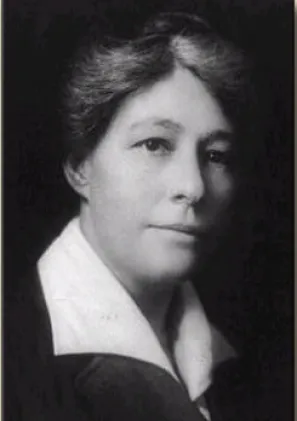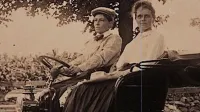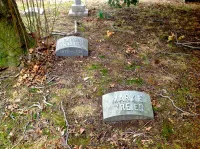Biography
1873 - 1952
“The old world is engaged in a struggle to find a way by which each race living on its own soil, separated by definite national boundaries, can be assured freedom and peace in the full development of its national life and in the realization of international opportunities. The task of America is different. It is for her to find the way by which these races, living on one soil, under one form of government, with no territorial lines, can be assimilated and become a part of her integral national life.”
– Frances Kellor
Frances Alice Kellor received her law degree from Cornell in 1897 and soon after entered the University Of Chicago to study criminal sociology. She eventually spent nearly two years in southern penitentiaries for African Americans. Her resultant book, Experimental Sociology (1901), helped launch the modern concept that environmental factors — such as disadvantaged childhoods and poor education - play a determining role in criminal behavior and should thus be considered important in the of reform social policy. After moving to New York City in 1903, Kellor undertook a subsequent study of the exploitation of domestic workers by employment agencies. The resulting book, Out of Work (1904), was among the first books to present unemployment as a Federal problem rather than simply a personal misfortune. It was around this time that she fell in love with activist Mary Dreier. In 1906, Kellor was instrumental in organizing the National League for the Protection Of Colored Women, which worked to find jobs and housing for African American women migrating north. In 1908 Kellor was appointed to New York State Immigration Commission. Her research led to the creation of the Bureau of Industries and Immigration, which provided arbitration between workers and employers and produced leaflets in various languages warning immigrants to beware of exploitative practices. In 1912 Kellor began work with the Progressive Party, which believed in using the state for social reform. She headed the party's National Service Committee, preparing official statements and research, making her instrumental in shaping Theodore Roosevelt's campaign agenda. In this way Kellor became a key player in presidential politics before women even had the right to vote. Continuing her work for the compassionate assimilation of immigrants, Kellor devised programs that provided language and citizenship classes as well as vocational training. In 1921 she transitioned from studying international laws pertaining to immigrants to studying international arbitration. In 1926 she launched the American Arbitration Association and wrote Arbitration in the New Industrial Society (1934). Frances Kellor was still vice-president of the American Arbitration Association when she died in 1952 in the home she had shared with Drier since 1905. She was 78.
1873 - 1952
“The old world is engaged in a struggle to find a way by which each race living on its own soil, separated by definite national boundaries, can be assured freedom and peace in the full development of its national life and in the realization of international opportunities. The task of America is different. It is for her to find the way by which these races, living on one soil, under one form of government, with no territorial lines, can be assimilated and become a part of her integral national life.”
– Frances Kellor
Frances Alice Kellor received her law degree from Cornell in 1897 and soon after entered the University Of Chicago to study criminal sociology. She eventually spent nearly two years in southern penitentiaries for African Americans. Her resultant book, Experimental Sociology (1901), helped launch the modern concept that environmental factors — such as disadvantaged childhoods and poor education - play a determining role in criminal behavior and should thus be considered important in the of reform social policy. After moving to New York City in 1903, Kellor undertook a subsequent study of the exploitation of domestic workers by employment agencies. The resulting book, Out of Work (1904), was among the first books to present unemployment as a Federal problem rather than simply a personal misfortune. It was around this time that she fell in love with activist Mary Dreier. In 1906, Kellor was instrumental in organizing the National League for the Protection Of Colored Women, which worked to find jobs and housing for African American women migrating north. In 1908 Kellor was appointed to New York State Immigration Commission. Her research led to the creation of the Bureau of Industries and Immigration, which provided arbitration between workers and employers and produced leaflets in various languages warning immigrants to beware of exploitative practices. In 1912 Kellor began work with the Progressive Party, which believed in using the state for social reform. She headed the party's National Service Committee, preparing official statements and research, making her instrumental in shaping Theodore Roosevelt's campaign agenda. In this way Kellor became a key player in presidential politics before women even had the right to vote. Continuing her work for the compassionate assimilation of immigrants, Kellor devised programs that provided language and citizenship classes as well as vocational training. In 1921 she transitioned from studying international laws pertaining to immigrants to studying international arbitration. In 1926 she launched the American Arbitration Association and wrote Arbitration in the New Industrial Society (1934). Frances Kellor was still vice-president of the American Arbitration Association when she died in 1952 in the home she had shared with Drier since 1905. She was 78.
Demography
Demography
Gender Female
Sexual Orientation Lesbian
Gender Identity Cisgender
Ethnicity Caucasian/White
Nations Affiliated United States
Era/Epoch First-wave Feminism (1848-1930) Interwar Period (1918-1939) Progressive Era (1890-1920)
Field(s) of Contribution
Author
Politics
Social Justice
Commemorations & Honors
Organized National League for the Protection Of Colored Women (1906)
Leader of Progressive Party National Service Committee (1912)
Formed Committee for Immigrants in America (1914)
Launched American Arbitration Association (1926)
Demography
Gender Female
Sexual Orientation Lesbian
Gender Identity Cisgender
Ethnicity Caucasian/White
Nations Affiliated United States
Era/Epoch First-wave Feminism (1848-1930) Interwar Period (1918-1939) Progressive Era (1890-1920)
Field(s) of Contribution
Author
Politics
Social Justice
Commemorations & Honors
Organized National League for the Protection Of Colored Women (1906)
Leader of Progressive Party National Service Committee (1912)
Formed Committee for Immigrants in America (1914)
Launched American Arbitration Association (1926)
Resources
Resources
Faderman, Lillian. To Believe in Women: What Lesbians Have Done for America--A History. Boston: Houghton Mifflin, 1999.
Fitzpatrick, Ellen. Endless Crusade: Women Social Scientists and Progressive Reform. Oxford: Oxford University Press, 1990.
Press, John. Founding Mother: Frances Kellor and the Creation of Modern America. New York City: Social Books, 2012.
Press, John Kenneth. Founding Mother: Frances Kellor and the Quest for Progressive Democracy. New York City: Social Books, 2011.
http://en.wikipedia.org/wiki/Frances_Kellor
https://www.lgbtqnation.com/2018/10/frances-kellor-lesbian-behind-multiculturalism/
https://glreview.org/article/get-to-know-frances-kellor/
http://faculty.webster.edu/woolflm/kellor.html
https://epgn.com/2018/10/18/frances-kellor-and-the-birth-of-multiculturalism/
https://www.michiganradio.org/post/remembering-frances-kellor-defender-downtrodden
Resources
Faderman, Lillian. To Believe in Women: What Lesbians Have Done for America--A History. Boston: Houghton Mifflin, 1999.
Fitzpatrick, Ellen. Endless Crusade: Women Social Scientists and Progressive Reform. Oxford: Oxford University Press, 1990.
Press, John. Founding Mother: Frances Kellor and the Creation of Modern America. New York City: Social Books, 2012.
Press, John Kenneth. Founding Mother: Frances Kellor and the Quest for Progressive Democracy. New York City: Social Books, 2011.
http://en.wikipedia.org/wiki/Frances_Kellor
https://www.lgbtqnation.com/2018/10/frances-kellor-lesbian-behind-multiculturalism/
https://glreview.org/article/get-to-know-frances-kellor/
http://faculty.webster.edu/woolflm/kellor.html
https://epgn.com/2018/10/18/frances-kellor-and-the-birth-of-multiculturalism/
https://www.michiganradio.org/post/remembering-frances-kellor-defender-downtrodden





